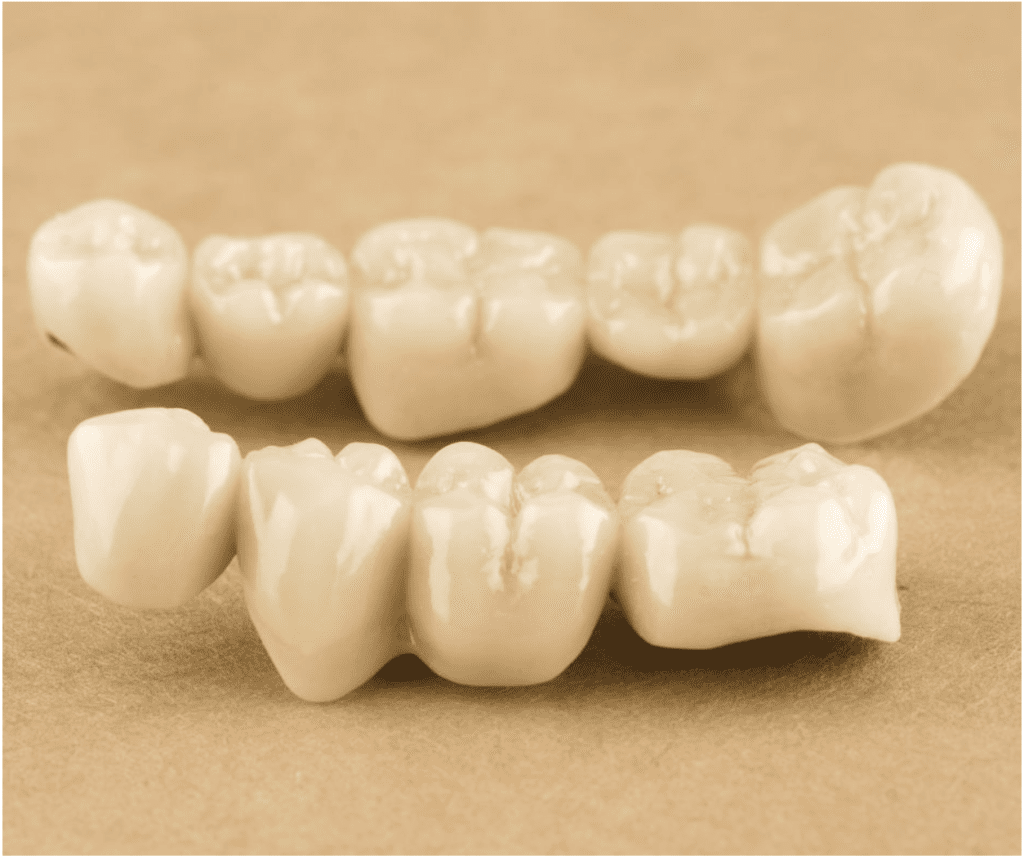A fixed bridge is a great way to improve the look of your smile and replace one or more missing teeth. The success of a fixed bridge depends on the overall condition of your mouth and other teeth, good home dental care, and professional maintenance.
If you consider getting a fixed bridge, you’re probably wondering how long it would last you. Well, this post is right for you, as our expert family dentist shares more information on this topic:
What Are Dental Bridges Made Of?
Dental bridges are commonly made of porcelain or ceramic but can also be made of metal or a combination of materials. The type of dental bridge you will get depends on several factors, including the strength and stability of the surrounding teeth, your bite, and your aesthetic preferences.
Porcelain and ceramic bridges are often chosen for their natural appearance. These materials can be matched to your existing teeth, making your dental bridge virtually undetectable. Porcelain and ceramic are also strong and durable materials that can withstand the force of biting and chewing.
Metal bridges are also popular, as they are very strong and can last for many years. However, metal bridges are more visible than porcelain or ceramic bridges and may not be the best choice if you want a natural-looking restoration.
How Long Do Fixed Bridges Last?
Assuming you maintain good oral hygiene, fixed bridges can last many years. With proper care, many bridges last over ten years, and some last over 25 years.
Your bridge’s lifespan depends on your mouth’s health, how well you take care of your teeth, and your overall oral hygiene habits.
How to Ensure Your Fixed Bridges Last for Many Years
When it comes to dental bridges, it is vital to ensure that they are adequately cared for to prolong their lifespan. Here are four tips on how to ensure your fixed bridges last for many years:
1. Practice good oral hygiene. This means properly brushing and flossing your teeth and using an antibacterial mouthwash.
2. Avoid hard and sticky foods. These can cause the bridge to become dislodged or damaged.
3. See your dentist regularly. This will help to catch any problems early and keep your mouth healthy.
4. Quit smoking. This habit can lead to gum disease, which can result in the loss of teeth and damage to dental bridges.
How to Prepare for Your Dental Bridge
If you’re considering getting a dental bridge, you can do a few things to prepare for the procedure. First, it’s crucial to have a consultation with your dentist to discuss whether a bridge is the right solution for you. Once you’ve decided to proceed with the procedure, your dentist will take X-rays and impressions of your teeth to determine the best way to place the bridge.
If you have any existing dental work, such as crowns or fillings, your dentist must consider this when placing the bridge. Once your dentist has all the necessary information, they can give you a more specific timeline for the procedure.
In the meantime, some things can be done for you to be ready for your dental bridge. First, it’s important to maintain good oral hygiene. This means brushing and flossing regularly, as well as using mouthwash. It’s also vital to avoid any hard or crunchy foods that could damage your teeth.
Conclusion
Dental bridges are a good treatment option for patients who lost one or more teeth. They can be made from a variety of materials, including gold, porcelain, and metal, and are typically supported by dental implants or natural teeth. Bridges are a long-term treatment option and can last for many years with proper care. If you are interested in getting bridges, visit your family dentist to have your case assessed.
Danvers Aesthetic Family Dentistry offers various services, including dental bridges in Danvers. Schedule your appointment with our dentist today so we can discuss this treatment!

